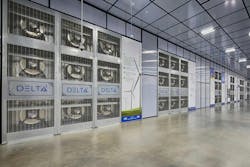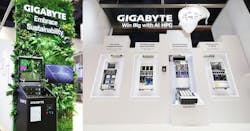The data center industry is now widely acknowledged to be entering a period of exponential expansion, hinged on the present, imminent, stratospheric rise of AI/ML applications and associated influx GPU server deployments.
This overarching trend was again exemplified this week in public remarks by Meta's founder, chairman and CEO, Mark Zuckerberg. In an update on AI efforts, the Meta chief revealed that his company is building "a massive amount of infrastructure."
"At the end of this year, we'll have ~350k Nvidia H100s -- and overall ~600k H100s [and] H100 equivalents of compute if you include other GPUs," wrote Zuckerberg on Threads.
That's a lot of GPU compute, even for just one hyperscale colossus.
Of course, other facilities of all varieties are now following in Meta's footsteps, or soon will be, chasing the AI dragon from the cloud to the edge to the enterprise -- creating a similarly massive impetus for the deployment of data center liquid cooling technologies.
Inevitably, the industry is quickly responding with a variety of new platform and program innovations surrounding liquid cooling.
Here we take a look a several such initiatives, emanating from both data center operators and equipment providers, spanning the gamut of direct-to-chip, immersion cooling, rear door heat exchanger, and hybrid designs.
Aligned Data Centers Launches DeltaFlow~
Aligned Data Centers this week announced the launch of its DeltaFlow~ liquid cooling solution, a patent-pending technology designed to support the high-density compute requirements of emergent and future applications in high-performance computing (HPC), artificial intelligence, machine learning, and supercomputers.
DeltaFlow~ is an extension of Aligned’s ExpandOnDemand platform capabilities, billed as offering customers the "flexibility to seamlessly pivot and scale to support shifting computing environments – no matter their applications, density requirements, or cooling solutions."
DeltaFlow~ is billed as a turnkey solution delivered within a standardized delivery process to streamline liquid-cooled deployments. The company notes that its scalable, universal architecture supports customers’ customization requirements, as well as integration with current and future liquid cooling technologies, including direct-to-chip, rear-door heat exchangers, immersion cooling, and others.
DeltaFlow~ also integrates seamlessly with Aligned’s patented air-cooled technology, Delta3, requiring no changes in power delivery or existing data hall temperatures, and making the transition from air to liquid cooling seamless, even in live environments, as stated by the company.
Aligned emphasized that its proprietary DeltaFlow~ and Delta3 cooling technologies are designed to easily allow customers to transition from air-cooled to liquid-cooled systems, or to deploy hybrid cooling systems combining both air and liquid in the same data hall.
Such flexibility may eliminate the need to construct new AI-dedicated build-to-suit data centers or completely retrofit and retool existing facilities, the company contends.
The company said the platform is capable of supporting densities ranging from three to 300 kW per rack and higher, while still maintaining a commitment to sustainability and waterless designs, as it employs a standard, closed loop system.
“Aligned has been a leader and innovator in data center cooling for more than a decade. Providing customers the ability to scale seamlessly across rising rack densities is intrinsic to our data center designs; we call it ExpandOnDemand,” explained Andrew Schaap, CEO of Aligned.
“DeltaFlow~ is an extension of these capabilities," continued Schaap. "Our universal liquid cooling platform allows customers to maximize advancements in chipset technology and realize the benefits of GPUs across a wide range of computing applications, while mitigating time-to-market, cost, and risk.”
Aligned Data Centers noted that it has also been working closely with leading chip and server manufacturers as part of an ongoing commitment to innovation, the better to ensure its customers have the advantage of a scalable, universal architecture that supports both current and future cooling requirements.
Accelsius Partner Program Eases Direct-to-Chip Liquid Cooling Transitions
For its part, Accelsius has also now unveiled a new partner program to support the rapid growth of demand for its NeuCool direct-to-chip liquid cooling solutions.
The NeuCool platform is billed as a patented, water-free, direct-to-chip, two-phase cooling system, delivering best-in-class thermal efficiencies and reliability at scale to address high-performance CPU and GPU chips serving new data center compute loads for AI and ML.
The company said its associated Accelerate Partner Program provides resources and a collaborative market model for system integrators and data center infrastructure providers to employ as they guide their customers through the journey from air to liquid cooling.
Accelsius said the program guides customers through such transitions by bringing together top system integrators, OEMs, cooling solutions specialists, and other data center IT providers throughout the U.S. and Canada.
According to a press release, the Accelerate Partner Program offers partners numerous benefits, including:
- Pricing and discounts: Solution partners receive specified discounts on the core Accelsius solution based on partner tier and the project-specific role.
- Training and certification: Instructor-led and/or on-demand training on Accelsius’ core solutions, held at the partner’s office, Accelsius headquarters or remote (videos, webinars, etc.), plus additional training available for delivered integration and deployment services.
- Sales support and co-selling: Partners are assigned a channel sales manager to guide and assist the partner with the joint business plan and go-to-market strategies.
- Pre-sales support: An Accelsius solution architect will guide and assist the partner in pre-sales actions, customer assessments, scoping and sizing of Accelsius solutions, as well as technical knowledge transfer.
- Marketing and demand generation: Joint marketing actions include logo and website representation, branded sales and marketing collateral, demand generation campaigns, trade show and event representation, webinars and events, press releases, case studies and white papers.
- Market development funds: Partners can earn funds based on revenue attainment goals to be reinvested into growing the partner’s Accelsius business.
- Access to Accelsius labs: Partners have access to Accelsius’ research and development facility in Austin, and discounted equipment is available to eligible partners for lab and demo purposes.
“At Accelsius, our success depends on our ability to enable our partners’ success. And developing a world-class partner ecosystem is a strategic priority,” remarked Accelsius CEO Josh Claman, adding, “Our partners are more than a force multiplier at Accelsius -- they are our lifeblood and our route to market.”
Data Center Immersion Cooling Advancements
The outlook for data center immersion cooling technology has been hot for several years, and is on track to escalate further this year.
For one operator, NTT noted in its key technology predictions for 2024 that the company is already using techniques including liquid immersion cooling (as well as district heating projects and researching solar panels in space) to ensure sustainability prospects as AI drives investment in more disruptive energy supplies for data center infrastructure.
This month also finds thermal management specialist Modine touting its investment in liquid immersion cooling technology to support high-density data center applications.
Wisconsin-based Modine has now purchased the intellectual property and other specific assets of TMG Core, a specialist in single- and two-phase liquid immersion cooling technology for data centers with high-density computing requirements.
The investment adds single- and two-phase immersion cooling technologies to Modine's portfolio, shoring up the company's position as a complete cooling solutions provider as data center heat loads rise.
"Modine's investment in liquid immersion cooling technology advances our strategy to expand our global data center product offering and capture market opportunities that help us achieve our long-term growth targets," said Neil Brinker, President and CEO of Modine.
The new investment positions Modine to capture share in the rapidly developing data center liquid cooling market, which analysts forecast to reach $7.8 billion by 2028, as cited by the company.
Brinker added, "This investment strengthens Modine's position in the rapidly growing data center market, providing our customers with advanced solutions to support high-density, accelerated computing applications, such as generative artificial intelligence, 5G and machine learning."
The company points out that, in addition to facilitating high-density compute, liquid immersion cooling also serves edge data center applications where data processing must be closer to the source to reduce latency, such as in autonomous vehicles.
Eric McGinnis, President of Modine Climate Solutions, remarked:
"Modine's investment in liquid immersion cooling technology expands the innovative solutions our Airedale brand can offer throughout the thermal chain, allowing us to cover air, liquid and hybrid systems.
Our customers lean on us to help them solve the heat problem in next-generation, mission-critical IT applications where they need to maximize processing efficiency, while complying with increasingly strict emissions and energy efficiency requirements. We look forward to working with our key customers and partners in this increasingly critical area, supplying complete systems with intuitive controls that are manufactured and supported globally."
GIGABYTE Brings Data Center DLC and Immersion Cooling to CES 2024
Also recently in the arena of data center liquid cooling, along with unveiling four top-tier AI/HPC servers at this month's CES 2024 tradeshow, Taiwan's GIGABYTE and its subsidiary, Giga Computing, brought their direct liquid cooling (DLC) and all-in-one single-phase immersion cooling technologies to the exhibition, in the form of an in-house server cabinet and immersion tank.
The company's AI/HPC server series is highlighted by units supporting the AMD Instinct MI300A APU, NVIDIA Grace Hopper Superchip, and NVIDIA HGX H100 8-GPU, new chips designed to handle the exponential growth of AI, while managing the AI landscape's soaring model parameters and datasets.
Sunon Launches Range of Data Center Liquid Cooling Solutions
Finally, last December Taiwan's Sunon announced a range of liquid cooling offerings tailored to advanced data centers equipped with high-capacity CPU and GPU computing for AI, edge, and cloud servers.
The Sunon array of cooling modules and systems includes direct cooling solutions, rear-door heat exchangers (RDHx), and reservoir and pumping units (RPU).
Sunon says its associated liquid cooling design services are ideally suited for data centers engaged in generative AI computing and HPC applications, with solutions "meticulously customized to fit the cooling space and server density of each data center."
The company notes that its open-loop direct cooling modules have been seamlessly integrated into various rack server applications. According to Sunon:
These solutions are engineered to align with system structures, ensuring a unique thermal contact configuration between surfaces, curvature of water pipes, and coolants. They cater to servers with high-performance cooling requirements, such as thermal contact resistance (Rth) below 0.04 ℃ /W, liquid flow of 1.25 LPM, and TDP of up to 700W.
The company adds that its cooling solutions are also fully compatible with Intel dual Socket Eagle Stream (EGS) processors for enhanced operational efficiency.

Matt Vincent
A B2B technology journalist and editor with more than two decades of experience, Matt Vincent is Editor in Chief of Data Center Frontier.






